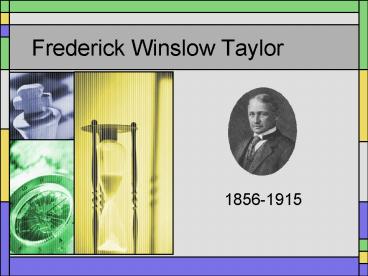Frederick Winslow Taylor - PowerPoint PPT Presentation
1 / 22
Title:
Frederick Winslow Taylor
Description:
Frederick Winslow Taylor 1856-1915 Influences - Family History Father Pennsylvania Quaker family Lawyer Owned farms and properties Very Wealthy Influences - Family ... – PowerPoint PPT presentation
Number of Views:1239
Avg rating:3.0/5.0
Title: Frederick Winslow Taylor
1
Frederick Winslow Taylor
- 1856-1915
2
Influences - Family History
- Father
- Pennsylvania Quaker family
- Lawyer
- Owned farms and properties
- Very Wealthy
3
Influences - Family History
- Mother - Emily Winslow (Delano)
- New England Puritan Family
- Related to Franklin Delano Roosevelt
- Anti-slavery agitator
- Campaigner for womens rights
- Child rearing philosophy based on work, drill
and discipline. - Believe in definite instructions for Fred
4
Influences
- Affluent family
- Attended Phillips Exeter Academy
- Destined for Harvard
5
Influences - Early Work
- Started as an Apprentice
- 1878 - Midvale Steel as a Clerk
- Moved down the company ladder - laborer
- Role changed almost monthly
- Keeper of tools, assistant foreman, foreman,
master mechanic, director of research, chief
engineer of the plan - 1880-1883 Engineering at Stephens Institute
6
Influences - Other Than Mother
- Adam Smith - Process-driven model of management
7
Tendencies
- Incredibly driven problem solver
- Inventor
- Taylor-White process for treating tool steel
- Spawned over forty patents
- Sportsman
- Passion for Order and Efficiency
- Persistent
- Personal Tendencies
8
Accomplishments Theories
- 1889 - Bethlehem Steel Company
- Tried wide ranging changes
- Fired in 1901
- Experience laid the basis for theories of
Scientific Management
9
Scientific Management
- Workers engaged in soldiering
- Superiors had no idea how long a job should take
- No one thought to examine the nature of peoples
work
10
Scientific Management
- Armed with stopwatch, examined exactly what
happened and how long it took - Minute examination allows an observer to
establish a best means of carrying out the job
11
Scientific Management
- Workers would know what was expected
- Managers would know how much should be produced
- Reliable piecework rates, bonuses, penalties
12
Scientific Management
- Quality of the work had to be stressed before
striving for an increased Quantity of work - Paid for performance, not attendance
- Advocated daily feedback
- Seventy five percent science and twenty five
percent common sense
13
Scientific Management Exercise
- Build 20 Pieces as specified
- Two Red 4x2
- Two Black 4x2, crosswise
- One White 2x2, on middle
14
Scientific Management - Results
- Watertown Arsenal (Labor Cost Reductions)
- Packsaddle from 1.17 to .54
- 6 Gun from 10,229 to 6,950
- Typically, Schmidt increased production 400
while receiving 60 more pay - Often boosted production
15
Scientific Management - Results
- 1910 - Harrington Emerson claimed the railroads
could save 1 Million per day - Immediate result was a dramatic cut in the cost
of manufactured goods - Potentially allowed for an increase in wages
- Also resulted in crude reductions in employee
numbers
16
Frederick Taylor - Contributions
- Invented Management as a Science
- Established the job of management as measurement
- Created middle management
- Intended SM to cover the whole organization
- First management consultant (Consultant to
Management)
17
Frederick Taylor - Recap
- Earned approximately 50,000 per year from 1900
to 1911 from consulting - Had three maids, estate superintendent, cook,
coachman and yard laborers - Taught in France and Germany
- 1910 - refused his share of his fathers 900,000
estate - 1915 - Taylors estate worth 700,000
- Died after a lecture tour in Cleveland
18
Frederick Taylor - Supporters
- First International Management Theory
- Japanese
- Lenin
- Henri Le Chatelier
- Frank Lilian Gilbreth
- Peter Drucker
- Henry Gantt
- Henry Ford
- Hugo Munsterbuerg
- Champy/Hammer
19
Frederick Taylor - Criticisms
- Relied on money to motivate
- Efficiency before ethics
- Views in accord with socialism
- Increased wages until competitions catches up
- Built on a lack of trust, a lack of respect for
the worth, wit and intelligence of individuals
20
Frederick Taylor - Criticisms
- Eliminated qualified, professional work
- Focus on making the task more stupid
- Believed people did not need to be told what was
happening elsewhere in the organization - Employees had to turn off their minds
- Denied people their individuality
21
Frederick Taylor - Criticisms
- 1909 - U.S. Steel, 3500 workers revolt
- 1911 - Taylor questioned at a special committee
of the U.S. House of Representatives - Nightmare visions explored in literature
22
Where Do We Go From Here?
- Peter Drucker
- Knowledge workers are abysmally unproductive
- Challenge of the next century is to increase the
productivity of knowledge workers - Lucier and Torsilieri
- Routine work (80) needs to be standardized.
- Complex decisions should be outsourced































